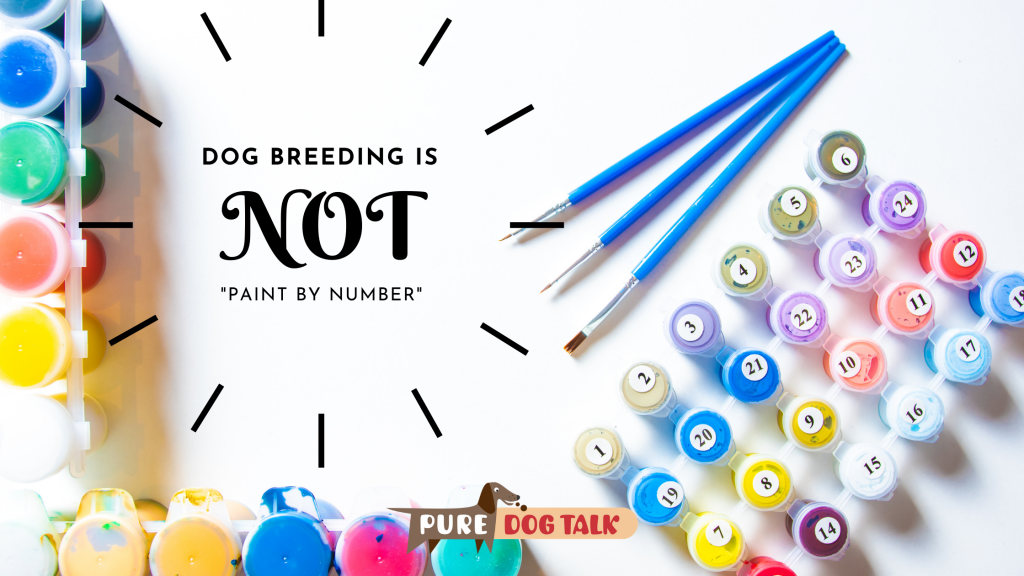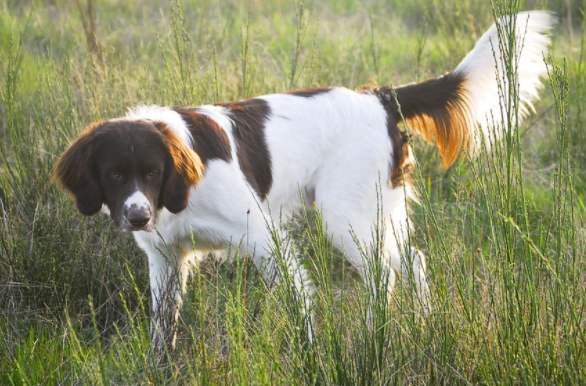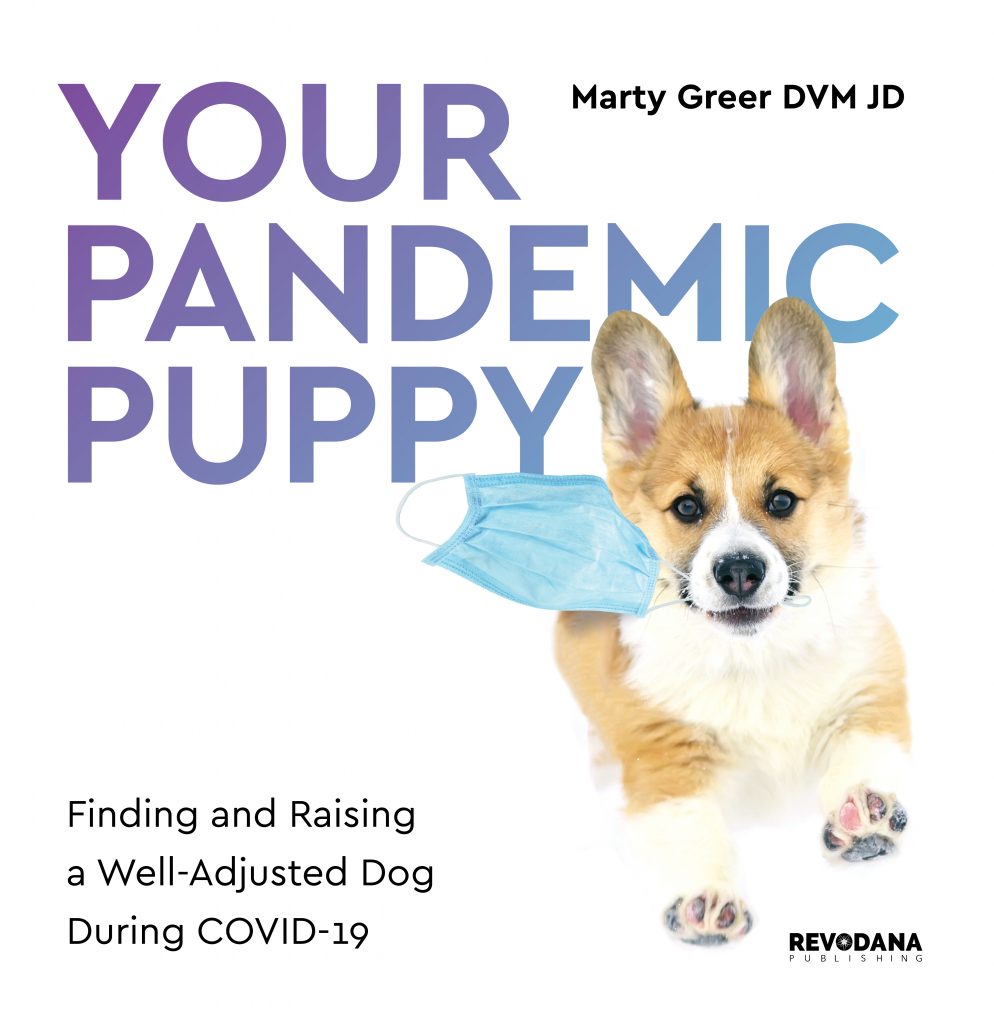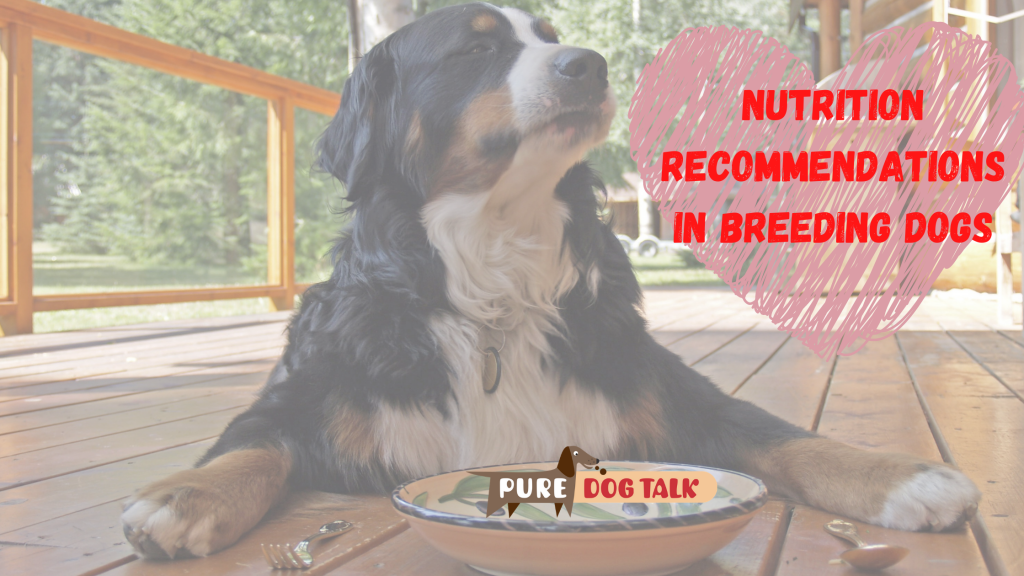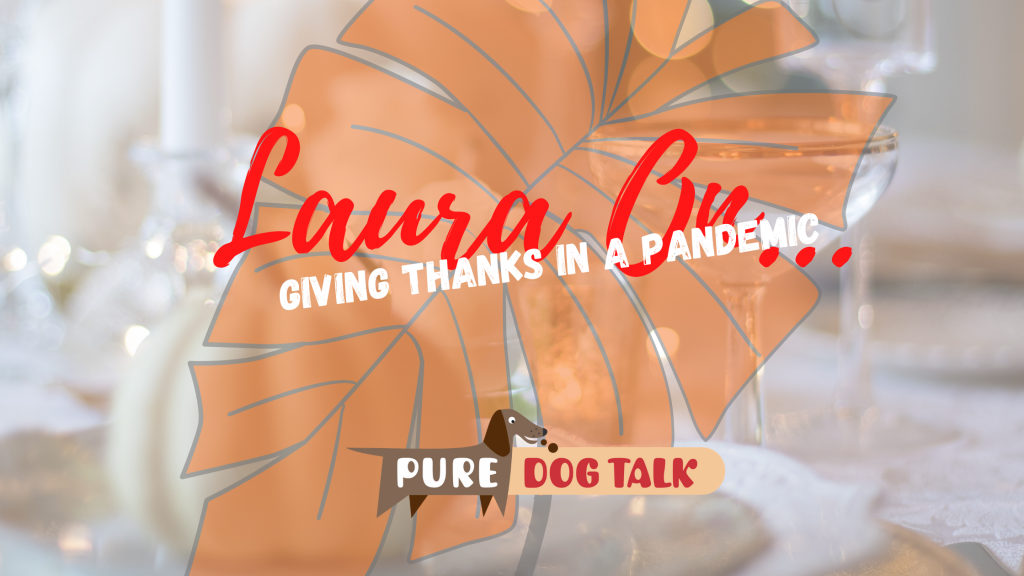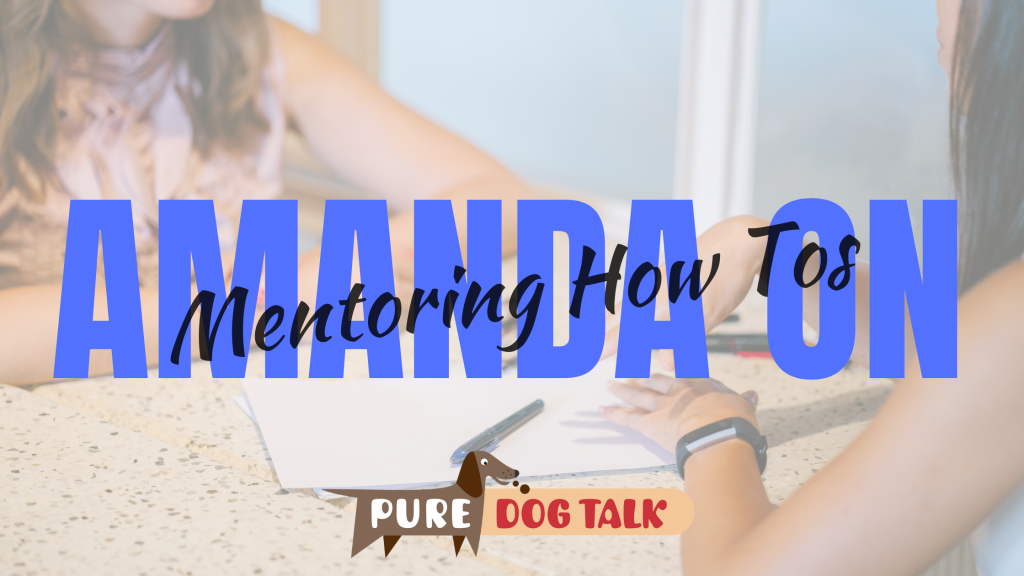Posts by Laura Reeves
454 – Danish Swedish Farmdogs – Friendly, Low Maintenance, Sturdy
Danish Swedish Farmdogs – Friendly, Low Maintenance, Sturdy
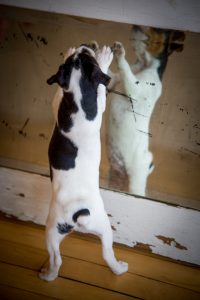 Dr. Marty Greer joins host Laura Reeves to talk about the FSS breed with which she’s fallen in love. Danish Swedish Farmdogs date to the 1700s but were saved from extinction by the joint effort of the Danish and the Swedish Kennel Clubs in 1987.
Dr. Marty Greer joins host Laura Reeves to talk about the FSS breed with which she’s fallen in love. Danish Swedish Farmdogs date to the 1700s but were saved from extinction by the joint effort of the Danish and the Swedish Kennel Clubs in 1987.
History
Greer notes that the breed was originally from Denmark and their job was “sort of an all-purpose farm dog”.. so they were to herd, they were to play with the kids, be able to be Watch Dogs … “that’s kind of what appealed to me about them, is they’re a hardy little dog.”
“They’re cool little dogs,” Greer said. “I find them to be absolutely fascinating and really easy to get along with. Every time you see pictures of them, they are stacked on top of each other sleeping. They don’t have that terrier snarky, sparring kind of attitude.
Size and Grooming
“The males are probably 22 to 24 pounds. The females are 18 to 20. They are small enough dog that you can pick them up under one arm, you can put them in a Sherpa bag and fit them under the seat of an airplane. So if you’re going to be traveling they’re portable.
“One of the things that appeal to me about them is that easy to maintain coat. When I got into Corgis back in the 1980s, you’d wash your dog, you blow her out and you take her in the ring. You didn’t do anything else. Now there’s quite a bit of grooming that goes into a Corgi … I find that to be a little upsetting when you’re supposed to be showing a dog that’s natural.
“Well, this dog really is natural. There’s no trimming. There’s nothing you could trim other than their toenails. When you travel with them you just need a towel. You don’t need a brush. You need a towel and a leash.
Temperament and Activity
“There’s no dog aggression, no people aggression. Just kind of chill little dogs … they come in the house, do one loop-through, flop down on the couch and hang out with you the rest of the day. I really appreciate that about a dog because, by the time I’m done with a 14-hour shift, I don’t really want to come home and throw the tennis ball for two hours. So I appreciate a dog that has the ability to settle in the house. At the same time, there are a lot of activities that people do with them. They’re doing lure coursing, lots and lots of flyballs, lots of agility. They can be shown in FSS in AKC.
“They do have the ability to jump. My 4-month-old Farm Dog puppy is already scaling expenses. They’re relatively quiet. They will bark occasionally if the Corgis set them off, but they don’t usually initiate the barking.”
For more information, check out these resources.
http://www.fci.be/Nomenclature/Standards/356g02-en.pdf
https://dsfca.clubexpress.com/content.aspx?page_id=0&club_id=459025
453 – Dr. Jerold Bell: Dog Breeding is Not “Paint by Numbers”
452 – Drentsche Patrijshond: Hunting Dog, Property Dog, Family Dog
Drentsche Patrijshond: Hunting Dog, Property Dog, Family Dog
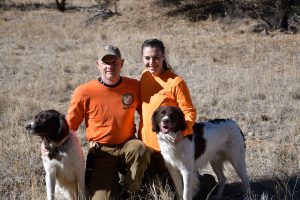 Rare breeds spotlight continues with the “Drent,” short for Drentsche Patrijshond, the all-purpose hunting dog of The Netherlands. Brian and Jenna O’Connor join host Laura Reeves to share their passion for this ancient breed.
Rare breeds spotlight continues with the “Drent,” short for Drentsche Patrijshond, the all-purpose hunting dog of The Netherlands. Brian and Jenna O’Connor join host Laura Reeves to share their passion for this ancient breed.
“(The breed is) about 350, almost 400 years old,” Brian said. “They were brought up through the Spanish occupation that went all up through France, Belgium, the Netherlands, in that little bit of western Germany. They brought over camp followers and their dogs, and they deposited all these dogs along the way. The Drent is one of these dogs that was kind of brought up through this phenomenon.
“Part of what makes the history of the Drent really unique is the province of Drenthe. It is a province with rolling hills. That’s where Vincent van Gogh came from … all those dark brooding skies is very typical of that landscape out there. …
 “The common man had the right to hunt there… This is 300 years ago. That wasn’t normal. So, if you were a priest or farmer, any professional class, you had the right to hunt. That was even unique within the country of the Netherlands, where hunting was reserved for nobility.
“The common man had the right to hunt there… This is 300 years ago. That wasn’t normal. So, if you were a priest or farmer, any professional class, you had the right to hunt. That was even unique within the country of the Netherlands, where hunting was reserved for nobility.
SUV of hunting dogs
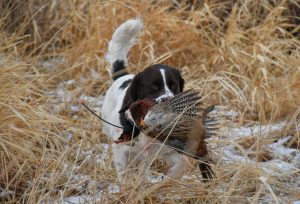 “So, you were this relatively poor person, odds are you were a farmer, and you could afford one dog … that one dog had to be able to do everything. So, if you were hunting Fox …if you’re hunting Swan or pheasant or Hungarian Partridge, if you’re hunting ducks whatever… oh, and by the way, when you needed to cart your milk or cheese or your vegetables to market on Wednesday, you would rig up your dog and the Drent would haul your goods to market for you.
“So, you were this relatively poor person, odds are you were a farmer, and you could afford one dog … that one dog had to be able to do everything. So, if you were hunting Fox …if you’re hunting Swan or pheasant or Hungarian Partridge, if you’re hunting ducks whatever… oh, and by the way, when you needed to cart your milk or cheese or your vegetables to market on Wednesday, you would rig up your dog and the Drent would haul your goods to market for you.
“They’re really close to their people, even if they don’t need to be sleeping on you. They’re going to be near you. There are the kind of dog that will not thrive in a kennel environment because they build that bond with their people and they’re not going to do well without their people. We don’t have a lot of reports of separation anxiety in the breed, but I would advocate for people to kennel train them. Otherwise, they’re going to find something to get into. They fall in the category of that smart continental versatile hunting dog that never should be left on its own.”
 “(The Drent) really doesn’t have a lot of grooming,” Jenna said. “You wouldn’t treat a dog for a show much different than you would treat a dog going on a hunt or around the house. (A) good brushing once a week, maybe more when they shed once a year. Some Drents can get a little bit longer ear hair. You can either pluck it with your fingers or you can use a stripping knife and just pull that dead hair out. Other than that, they have feathering but you really don’t trim that. If you want to trim their hair on the feet that’s great but really they’re pretty au natural.”
“(The Drent) really doesn’t have a lot of grooming,” Jenna said. “You wouldn’t treat a dog for a show much different than you would treat a dog going on a hunt or around the house. (A) good brushing once a week, maybe more when they shed once a year. Some Drents can get a little bit longer ear hair. You can either pluck it with your fingers or you can use a stripping knife and just pull that dead hair out. Other than that, they have feathering but you really don’t trim that. If you want to trim their hair on the feet that’s great but really they’re pretty au natural.”
“The numbers we just got last week was 3,600 (Drents worldwide). In the States, we have less than 150. Of that 150, less than 10% of those are approved for breeding. We only maybe have two … active breeders. So we are definitely in the realm of needing some breed fanciers to step in and really invest some time into these guys ’cause they’re amazing dogs,” Brian noted.
For more info:
Brian’s book: https://www.blurb.com/b/5491948-the-drentsche-patrijshond-for-the-north-american-f
Drentsche Patrijshond Club of North America: www.ADPA.org
451 – Pandemic Puppy: Inside Scoop on Marty Greer’s New Book
450 — Lancashire Heelers: Scrappy, Smiling and Opinionated
449 – Dr. Jerold Bell: Popular Sire Syndrome Defined
448 – Nutrition Recommendations in Breeding Dogs
Nutrition Recommendations in Breeding Dogs
Dr. Marty Greer and Sheryl Bradbury, owned brands manager at Revival Animal Health, join Host Laura Reeves for a discussion about micronutrients and supplements for breeding dogs.
“One of the concepts that we need to discuss is that there’s a likelihood that some of the commercial diets are not as nutritionally complete as they need to be for all stages of the dog’s life and that includes reproduction,” Greer said.
“Reproduction truly is a luxury in the body and it’s only going to happen if the body has already been able to take care of its vital organs. Then your body can start thinking about making sperm, making eggs, growing babies, all those parts. So it’s really important that we don’t overlook the micronutrients that sometimes are not mainstream enough for the general pet food company diets to be included in the food.
“Folic acid, of course, is important to reduce the risk of midline defects. These are primarily thought of as being cleft palates, but it can be cleft lips, it can be umbilical hernias, it can be open abdominal walls, spina bifida, any number of those types of midline defects where, during development, the right side and the left side of the body don’t find each other.
“A 5 milligram per dog per day dose (of Folic Acid) regardless of the size of the dog. That’s a pretty big dose. A lot of times, we only see something like 400 micrograms in a capsule or caplet when it’s purchased over the counter. So, you have to read the label. You have to make sure that you’re getting the product that you want. Revival’s been working on raising the amount of folic acid in their supplements to make sure that it’s sufficient.
“Studies show that the dogs that are clinically and genetically predisposed to developing cleft palates, such as the French bulldog, Chihuahua, the bulldog, they can significantly reduce by 50 to 60% the incidence of cleft palates. The most important thing to remember is you need to start it six weeks before the dog is bred, so you can’t wait until she comes into heat.
“DHA has been determined, through a really nice study from Canine Companions for Independence, to be essential in brain and eye development for puppies. Carbohydrates over the last few years have fallen into some interesting categories of the grain free diets. We lost some of the oatmeal, barley, rice, wheat, corn, those kinds of things and they’ve been replaced by peas, beans and lentils which are concerning.
“There’s a lot of other really little tiny nutrients that are difficult to really completely follow … that’s going to include tyrosine, arginine, taurine, vitamin E, biotin, vitamin A and vitamin C. Now vitamin A, we have to be really careful with because excessive amounts of vitamin A, found in things like too much liver or certain supplements, can actually cause midline defects. So it’s important that we’re paying attention to the details. There’s just a whole bunch of these little tiny nutrients that we assume are all in our foods but perhaps are not in the levels that we need for our bitches.
“The typical young male dog, up until the age of about four or five, is probably fine on most of the diets that we feed. But there are changes that happen in the kind of testosterone that is made in the testicles … so at that point, we really need to step up our nutrient profiles for the stud dogs.
“(An anecdotal survey of veterinarians regarding stud dog supplementation indicated that) typically there was a fatty acid supplement, there was some kind of an anti-inflammatory, whether it was ICSB-CF plus or one of the other glycoflex types of products. Sometimes selenium was included in that. And then L carnitine. L carnitine is important in the tail function and development in the stud dog’s sperm. So, it’s an assortment. It tends to be a little cocktail that most people put together in their practice for their stud dogs.”
447 — Giving Thanks in a Pandemic
446 – Mentoring How Tos: How to Give and How to Receive
445 – Stud Dog Shopping with Amanda Kelly
445 – Stud Dog Shopping with Amanda Kelly
Amanda Kelly, Fwaggle Toy Manchester Terriers, joins host Laura Reeves to talk about their favorite thing, shopping! Not for shoes but for stud dogs. Finding the right dog for your specific bitch, your breeding program as a whole and the breed in general, is a process that takes time and effort.
“When you’ve been breeding for a long time, you don’t really stop and think about what that process is,” Kelly said. “I think that there’s a couple of foundational pieces that go into choosing a stud dog. They may not seem like they’re directly related, but they really are so important.
“I think the first step is to look at your own bitch and your own breeding program and what you want to accomplish with a given breeding. One of the things that I keep coming back to is that you have to think about what your priorities are in a breeding. Before you start looking at any stud dogs or what anybody else has or what might be available or what might be possible, the very first thing to do is to really sit down and look at the bitch that you want to breed. What are her strengths? What are her weaknesses? What are the strengths and weaknesses of the family of dogs that she comes from.
“This whole process is really about research. You’re going to research a stud dog but you also are going to look really carefully at your family of dogs that you’re working with. You can learn so much about what will be or might be produced by looking at what has been produced. When we start out you kind of feel like you’re at a disadvantage because XYZ breeder has been breeding for 25 years and they know all of these dogs. That’s true. They have seen them over time, collected information, but some of that information really is available to everybody.
“Look at your bitch and think to yourself, ‘OK, were any of her littermates bred? What about dogs that are out of the same mother. Have they been bred? What about this bitch’s mother? Strong bitches are the cornerstone of any breeding program. What did the mother produce? What has the sire of my bitch produced?
“All of that information is going to fit together like pieces of a puzzle and give you a really clear idea of not only the strengths and weaknesses of your individual bitch but of perhaps the bloodline and what it’s producing.
“You can ask 25 breeders and you will get 25 different opinions of the relative merits of any approach to breeding and none of them are wrong. So the experience of your breed mentors, particularly folks who are working in the same group of dogs that you are within your breed, are really invaluable.
“There’s a longer term plan rather than 100% just the breeding that’s in front of you. I also like to think about what the priorities are for my breed. Coming from a small breed, there’s some elements I think of gene pool management. As a breeder in a small breed this is something that’s top of mind for me quite often in that there’s some gene pool management pieces that I think are important for me to consider as far as what’s the best for my breed’s diversity.”


